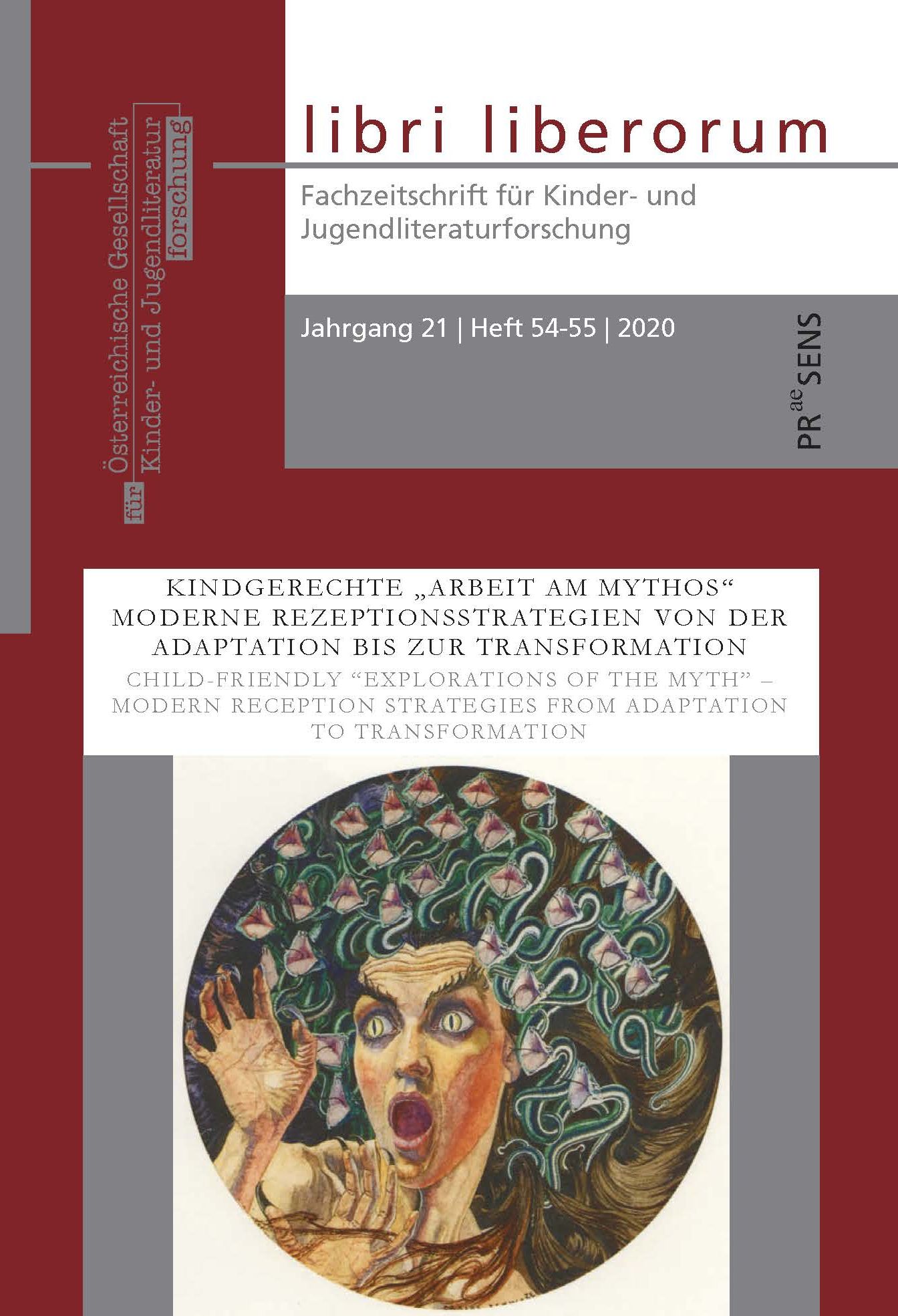Medusa-Metamorphosen: Die Rezeption der Gorgo Medusa in der Kinder- und Jugendkultur des 21. Jh. in ausgewählten Beispielen
Schlagworte:
Gorgoneion, Medusa in Nacherzählungen griechischer Mythen des 20. und 21. Jh., Versteinerungsmotiv, Rezeption des Mythos von Perseus und Medusa in Clash of the Titans (1981 & 2010); Medusa, Haar, Agency, Kinder, Kinderliteratur, doppeltes Zielpublikum, klassische Rezeptionsstudien, Mythologie, Monster, Familie, Identität, Kontrolle, Sozialisation, Joan Holub, Leslie Patricelli, Suzanne Williams; Akzeptanz, Göttinnen und Götter, Freundschaft, Medusa, Monster, olympisches Pantheon, Vorpubertät, Transformation, Joan Holub, Suzanne Williams; Gorgonenfamilie, männliche Medusa, coming of age, attraktive Ungeheuer, Teenager, Bedeutung von wahrer Liebe und echter Freundschaft, Legacies, Monster High; Atlantis, Fluch, Freundschaft, Herkules, Jason, Liebe, Medusa, Monster, Opfer, Prophetie, Pythagoras; Alter, Märchen, Mère Méduse, Kitty Crowther, Monster, Mutterschaft, alte Menschen, Percy Jackson, Rick Riordan, HexeAbstract
This text has been prepared within the project Our Mythical Childhood... The Reception of Classical Antiquity in Children’s and Young Adults’ Culture in Response to Regional and Global Challenges, which has received funding from the European Research Council (ERC) under the European Union’s Horizon 2020 Research and Innovation Programme under grant agreement No 681202, ERC Consolidator Grant (2016-2021), led by Katarzyna Marciniak, Faculty of “Artes Liberales”, the University of Warsaw.
Medusa ist eine der bekanntesten Figuren der Mythologie, ein Monster par excellence. Die antike Literatur überliefert zwei Versionen ihrer Geschichte – ein Urzeitwesen aus vorolympischen Zeiten (Hesiod, Theogonie 270-285) und eine junge Frau, die in Athenes Tempel von Poseidon vergewaltigt und von der Göttin, die den Vorfall als unsagbares Sakrileg (miss)deutete, in ein schreckliches Ungeheuer verwandelt wurde (Ovid, Metamorphosen 4,753-803). Im Lauf der Jahrtausende klassischer Rezeption trat Medusa hauptsächlich als mörderisches Ungeheuer in Erscheinung, das ein Held auf seinem “Campbellischen” Weg zum Ruhm besiegen muss (Campbell 2004). Dann konzentrierte sich Hélène Cixous auf ihre Stimme als Opfer – mit einem speziellen Fokus auf ihrer Weiblichkeit – und machte Medusa zu einer Ikone für Generationen von Frauen, die unschuldig und aufgrund einer Reihe sozialer Faktoren Leid erfuhren (Cixous 1976).
Greift ein ähnlicher Perspektivenwechsel auch in der kulturellen Aneignung für ein junges Publikum? Erscheint Medusa vor diesem kulturellen Hintergrund einfach als Ungeheuer oder doch eher als Opfer? Oder spielt sie sogar noch mehr Rollen? Wir unternehmen den Versuch, Antworten auf diese Fragen zu finden, indem wir die Analyse von Medusas Rezeption in zwei Filmen – Clash of the Titans im Original (1981) und seinem Remake (2010) – als Ausgangspunkt nehmen. Diese Analyse enthüllt charakteristische Züge eines Bildes, das in den 1980er-Jahren geschaffen wurde, einer für die Entwicklung der Populärkultur besonders wichtigen Epoche, und vergleicht und kontrastiert sie mit der Repräsentation, die die Realität des 21. Jh. transformiert hat. Die Untersuchung des Medusa-Charakters in den beiden Clashes-Filmen ist durchzogen von einem Überblick über die wichtigsten antiken Quellen und das zeitgenössische Narrativ durch Wissenschaftler*innen und Autor*innen, deren Ziel die Popularisierung der klassischen Antike ist.
Weiters stellen wir eine kurze Übersicht ausgewählter, zumeist weltweit zugänglicher Werke vor. Jedes einzelne ist einem bestimmten Abschnitt in Medusas Leben gewidmet. Als erstes treffen wir ein Kind, das seine ersten Schritte in die Welt macht (im Bilderbuch Brush Your Hair, Medusa! von Joan Holub und Leslie Patricelli). Dann stehen wir einer Teenagerin gegenüber, die die Bedeutung wahrer Akzeptanz entdeckt (The Goddess Girls-Serie von Joan Holub und Suzanne Williams). In einem dritten Teil folgen wir einem heranwachsenden Mädchen (und ebenso einem Burschen), die ihre Identität entwickeln (in den TV-Serien Monster High und Legacies – einem Spin-off von The Vampire Diaries). Später sehen wir eine erwachsene Frau, die für ihr Recht auf Glück kämpft (BBC TV-Serie Atlantis). Danach beobachten wir eine ältere Frau, zerrissen zwischen Liebe und Hass (Rick Riordans Percy Jackson). Und schließlich begegnen wir einer Mutter, die ihre Rolle in der Gesellschaft findet (im Bilderbuch Mère Méduse von Kitty Crowther).
Dieser aus literarischen und audiovisuellen Elementen zusammengestellte Lebenslauf der Medusa erlaubt uns einen neuen Blick auf die mythologische Figur. Versteinert sie immer noch mit ihrem Blick als Ungeheuer, ist sie ein Opfer, oder kann sie überhaupt eine Leitfigur für moderne Kinder und Jugendliche werden, um sich selbst besser kennenzulernen und gegenüber Anderen größere Empathie zu entwickeln?



